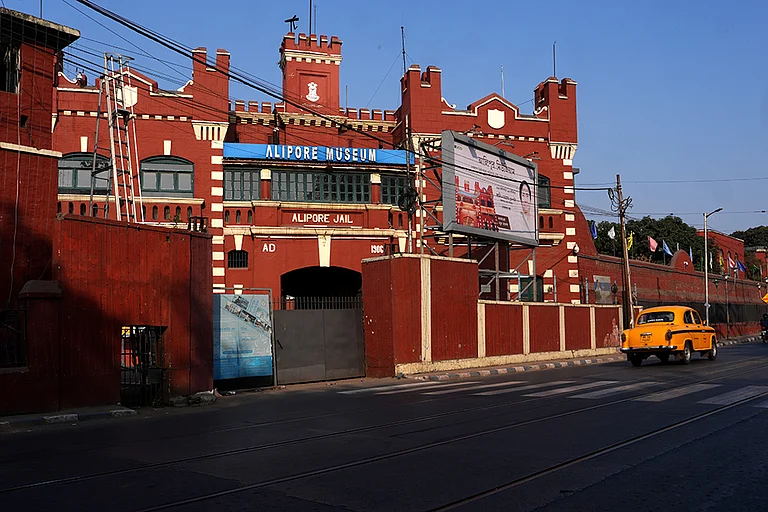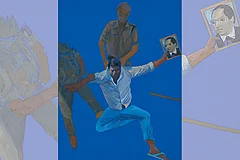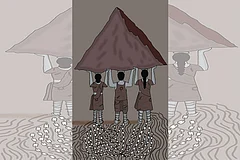On July 14, 2024, Deva Pardhi was picked up by the police in Guna, Madhya Pradesh, on his wedding day. His uncle too was arrested in connection with a theft case. Pardhi was brutally tortured and died in police custody. According to Pardhi’s family, “The police hanged them, upside down, tied a black cloth on their mouths and started beating them”. The police, however, said that he died of a heart attack.
On November 13, 2023, when people in Gujarat were celebrating their Diwali vacation, Nitin Sansi, a 22-year-old boy, was riding his bike. The Dahod police suspected that he was carrying liquor and they followed him. They pushed him from the running bike and he fell. He got badly injured. Instead of taking him to the hospital, the police beat him up, and he died on the spot due to a brain haemorrhage. When family members and Sansi community members went to Dahod police station to file a case against police officials, instead of registering their FIR, the police filed an FIR against around 400 community members under the Scheduled Castes and Scheduled Tribes (Prevention of Atrocities) Act. Even today, the FIR against the police officials has not been registered.
I can quote a number of incidents of brutal torture, rape, illegal detention, and mob lynching against the De-notified Tribes (DNTs), formally known as “criminal tribes” because of the Criminal Tribes Act, 1871 (CTA). The British left, but the stigma still haunts these tribes.
The British enacted the CTA to control the movement of India’s nomadic tribes who were transporters, singers, dancers, acrobats, magicians and jugglers. Under this act, the British notified around 200 tribes as “born criminals” and caged them in penal settlements that they called “reformatory settlements”. When India gained Independence in 1947, many prisoners were released from jails to celebrate the occasion. But the one section that could not witness India’s freedom was the so-called “criminal tribes” who were jailed in many “reformatory settlements” across India.
In 1949, the Indian government set up the Ananthasayanam Ayyangar Committee for their recommendations on the CTA. On January 4, 1952, a meeting was held in the room of the Union minister of state for home affairs, R K Sidhwa. The minutes of the meeting say that the committee was in agreement to repeal the CTA, but they emphasised that “future action should be taken under the Madras Restriction of Habitual Offenders Act (HOA) of 1948, extended to Delhi”. Taking note of the Ayyangar Committee’s recommendations, on August 31, 1952, the CTA was finally repealed and all notified “criminal tribes” were “de-notified”. And that’s why they are called DNTs. So, in theory, the CTA was repealed, but in practice, it was replaced by the HOA, and that is the reason that even today, the stigma of ‘criminal tribe’ is haunting them and they continue to face police oppression, interrogation, illegal detention, social exclusion and untouchability.
There is no uniform policy for their development or to de-stigmatise them. Many commissions were formed, but their reports are gathering dust in government departments.
Unfortunately, none of the historians took serious note about the contribution of DNTs to India’s Independence. The country has forgotten the martyrdom of nomadic tribal Sher Ali Afridi, who killed Lord Mayo, the then Viceroy of India, during his visit to the Andaman-Nicobar islands on February 8, 1872. Lord Mayo had given the green signal to the CTA. After killing him, Afridi was hanged to death on March 11, 1872, in Viper Island prison. How can we forget Sultana Daku, who resisted British officers, and Umaji Nayak, who fought against the British to save the jungles near Pune? We also forgot two Bhantu tribe members, freedom fighters Jashwant Singh and Malkhan, who fought with the Japanese in 1945 in Andaman, and both were shot dead. We come to know about such incidents from the diaries of British police officers.
It was not just the British who could not understand the nomad civilisation, but our own political leaders also committed some historical errors. Let me share a few.
In May 1921, when Gandhi visited Solapur to promote nationalist ideas to the people, the late Bhimrao Jadhav, who was an inmate in the Solapur settlement, met the Mahatma. I recorded his five-hour interview, where he said, “When I met Mahatmaji, I cried in front of him saying ‘Bapu, you are working for the freedom of this country, but when will you free us from these fenced jails?’ After hearing our cry, Bapu said, ‘Why don’t you drop a bomb on the angrej?’ Everyone in the room was stunned. Bapu was the advocate of ahimsa and was telling us to use violence! We took it seriously; we went back to the settlement and made the bomb; and, threw it on the police chowki. But the bomb did not burst; we were caught and sent to the Chhota Chakkar—a place for the harshest punishment within the settlement. Later, in the 1930s, we learnt from his letter exchanges with Gandhi ashram’s manager that he wanted to work for the upliftment of the ‘criminal tribes’, but alas, Godse killed him, not just him, he killed all the work that he was planning to do.” Godse ruined DNT’s future.
In July 1918, when the British asked Lokmanya Tilak about his thoughts about the inclusion of youth from the Berad and Ramoshi criminal tribes in the Indian Army, he said, “Thieving is their occupation. To receive beating is their occupation. They will not stand the discipline of the Army.”
On October 23, 1928, B R Ambedkar appeared before the Simon Commission in Pune for constitutional provisions for the depressed classes (DC). Primarily, he agreed to include “criminal tribes” in the definition of DC, but later he denied the inclusion of “criminal tribes” in the definition of DC. There was a lot of discussion about this topic between the Simon Commission members and Ambedkar. In response to question number 20, Ambedkar stated to the commission: “I do not think it would be possible to allow them the privilege of adult suffrage.” Later in his life, he realised his mistaken perspectives about CTs. In the preface of The Untouchables, Ambedkar says, “Besides the Shudras, the Hindu Civilisation has produced three social classes whose existence has not received the attention it deserves. The three classes are (1) The Criminal Tribes (2) Aboriginal Tribes and (3) The Untouchables.”
Unfortunately, there was no serious debate in the Constituent Assembly about the “criminal tribes”. When the Constitution of India was being written, no leader represented the “criminal tribes” in the constituent assembly. Even after Independence, most of the “criminal tribe” members were starving for their freedom, but it took five years and 16 days for the Ayyangar Committee to decide that the CTA was a blot on the Constitution of India. Though the government after Independence freed them from the CTA and settlements, there was no rehabilitation policy or constitutional provision for their upliftment. Even today, there is no uniform policy for their development or to de-stigmatise them. Many commissions were formed over the decades, but their reports are gathering dust in government departments. Recently, the Union government announced a package of Rs 5 crore for the 12 crore DNT population—it’s a cruel joke! DNTs are still waiting for their real freedom and that is… free from…. colonial stigma, torture and discrimination.
In 1998, inspired by writers Mahasweta Devi and Ganesh Devy, some of the Chhara de-notified tribe members decided to challenge the colonial stigma and fight for their Constitutional rights that were missed out after Independence. They established the Budhan Theatre, naming it after Budhan Sabar who died in custody. Budhan Theatre is experimental and has largely stuck to street theatre, combining the modern theatre format with the traditional cultural expressions of various communities. Budhan Theatre calls its technique/form, ‘poor theatre’ as it’s the kind that requires minimal resources and depends largely on the body and voice of the artists. The group performs its plays in any open or closed space such as a street, room or hall to establish intimacy with the audience. This, in turn, empowers the actors and strengthens their resolve and confidence, while at the same time transforming the audience through the theatre experience. It is an important cultural expression of the self-experience of DNTs that has been noted by many researchers and artist communities worldwide.
After every performance, we ask the audience, “Are we second-class citizens?”
Dakxin Chhara is an award-winning filmmaker, playwright and activist
(This appeared in the print as 'Inheritance Of A Tag')






























